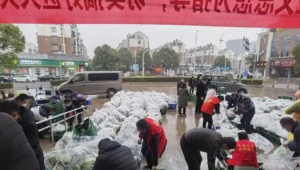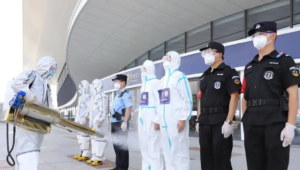
This morning, Tongzhou Century Star City, a new case of confirmed cases, the community temporary closure control
Today (October 26), a reader reflected that Yangzhuang Street Century Star City Xingye Park District Building 81 was taken for temporary closure and control due to a positive confirmed case.

According to the emergency notice issued today by the Century Star City Xingye Park Community Council, there is a positive case of new coronavirus in Building 81, according to the requirements of the Health and Construction Commission, the disease control department, the district for temporary control, the entire district only into the. Residents need to wait at home for further notice, follow-up, the community committee will be informed through the WeChat group, telephone and other means.
The scene of the actual investigation transfer vehicle, supplies rack is ready
According to residents, at 6:30 a.m. cell control, there are confirmed cases of Building 81 full home, door-to-door service; the rest of the building residents can go downstairs, not out of the district.


At the scene, the reporter observed that the “Great White” has been in place, three transfer vehicles parked at the entrance of the district, waiting for the street and community arrangements for personnel transfer; the entrance to the district set up a shelf of supplies, many couriers are delivering residents to purchase household goods.


The reporter was informed that some classes at Yangzhuang Campus of Tongzhou First Experimental Primary School have been notified of temporary suspension of classes. Some schools in the district have also issued notices one after another to check if there are students living in the Century Star City district.

The latest entry and exit policy in Beijing: the capital’s epidemic prevention and control measures adjusted, 7 major measures announced
On October 25, at the 247th press conference on the prevention and control of the novel coronavirus pneumonia in Beijing, Xu Hejian, Vice Minister of the Propaganda Department of the Beijing Municipal Party Committee, Director of the Municipal Government Information Office and spokesman of the Municipal Government, introduced that recently, the epidemic has occurred in many places in China, and Beijing has found out the associated and local cases outside Beijing one after another, and the situation of the epidemic is serious and complicated, and the risk of the epidemic and the pressure of prevention and control in the capital continues to increase. Beijing is the top priority of the national epidemic prevention and control, and must always maintain a high degree of vigilance, adhere to strict and tight prevention and control strategies, implement the “four early” requirements, and never relent in grasping the prevention and control work. In order to better prevent and control the epidemic scientifically and precisely, the capital city strictly manages the joint prevention and control coordination mechanism to adjust and strengthen the preventive and control measures in the capital. The main measures are informed as follows.
First, to minimize the activities out of Beijing. People in Beijing will not travel to Beijing in the near future unless necessary, and will not travel to prefectures where new infected persons and medium and high-risk areas are located. Party and government organs in Beijing, state-owned enterprises and institutions, the military to strengthen the daily epidemic prevention and control of their staff, strict approval of travel to Beijing, the implementation of “who applies, who is responsible” “who approves, who is responsible” requirements. Key places and industries may require personnel leaving Beijing to undergo nucleic acid testing immediately after returning to Beijing, and only after the results are negative can they return to work.
Second, continue to adhere to the policy of restricting the entry and return to Beijing of people from areas involved in the epidemic. The counties (cities, districts, banners) with one or more cases of indigenous NCCV infection and people with a history of travel in the county within 14 days are strictly restricted from entering and returning to Beijing, and the epidemic prevention requirements are implemented locally, and no green code is assigned to their “Beijing Health Care”. There is one or more cases of local new coronavirus infection in the prefecture-level cities (municipalities directly under the central government, sub-provincial cities, counties, cities and districts) and other counties do not enter or return to Beijing unless necessary.
Thirdly, all people entering Beijing must strictly check the “Beijing Health Care”. Airports, train stations, and long-distance passenger terminals across the country will check the “Beijing HealthPak” one by one for people coming to Beijing, and will strictly prevent non-green-coded people from boarding and boarding. For those who have not installed the “Beijing HealthBiz”, they will download and check their code status on site. For the elderly, children, people with visual and hearing disabilities and other groups, measures such as checking the code status of fellow passengers or checking their negative nucleic acid test certificates within 48 hours can be taken to facilitate the travel of people who do not use or cannot operate smartphones.
Fourth, strengthen the management of travel to and from Beijing. The public to minimize travel activities out of Beijing, the Beijing attractions strictly control the number of reservations. Suspension of cross-province travel, in-transit groups to strengthen the management of epidemic prevention. Continue to suspend the entry and exit tourism business.
Fifth, strict conference and forum epidemic prevention requirements. Meetings and forums and other activities adhere to the principle of non-essential not held, as far as possible in the form of video, to maximize the scale of offline activities to reduce the number of people from outside the capital. If it is necessary to hold, in accordance with the “who hosts, who is responsible” “who approves, who is responsible” principle, the strict implementation of the epidemic prevention requirements. The Beijing Marathon was postponed.
Sixth, the strict implementation of public places prevention and control measures. Open the parks and scenic spots, theaters, museums and other indoor and outdoor cultural and entertainment venues by 75 percent. Community chess rooms, mahjong parlors and other places to suspend business. Business buildings, supermarkets, restaurants, hotels, various stores and other types of indoor and outdoor public places, the strict implementation of the code registration, body temperature detection, wearing a mask, “one meter line”, cleaning and disinfection, limiting the flow of staggered peak and other measures, do a good job of orderly queuing and customer flow diversion, and firmly prevent the gathering of piles.
Seven is the strict implementation of the “four-party responsibility”. All kinds of employment units in Beijing to strengthen internal personnel management, the entry into Beijing, the risk of regional travel history of people and people involved in the epidemic, areas, places have interactions with people to be required to timely investigation and control reports, the omission of control and inspection of the problem found will be seriously investigated to pursue responsibility. Individuals should strictly implement the normalized prevention and control requirements, continuously improve the sensitivity of prevention and control, strengthen health monitoring if they have a history of residence and contact with people involved in epidemic areas, take the initiative to report at the first time, conduct nucleic acid testing and health management as required, and fulfill their personal prevention and control obligations. For those who refuse to cooperate with epidemic prevention and management and deliberately conceal their travel history, contact history and close contact history, they will be held legally responsible and publicly notified, so as to raise the awareness of the whole society on active epidemic prevention and control.


Average Rating